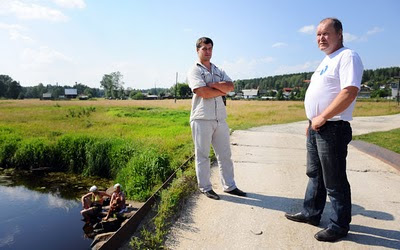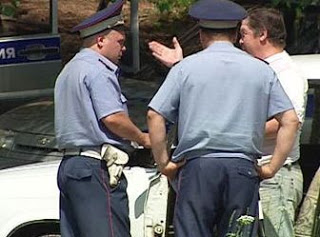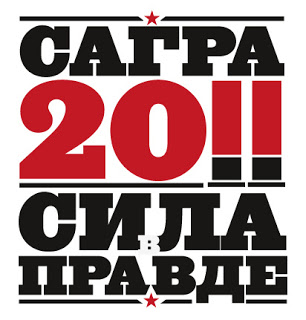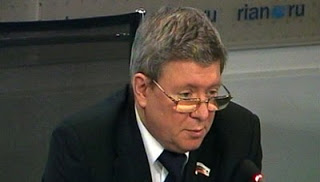 |
| No surrender, no retreat: Andrei (l) and Viktor Gorodilov at the bridge. |
“What would things have been like if
every Security operative, when he went out at night to make an arrest, had been
uncertain whether he would return alive? Or, if during the periods of mass
arrests ... people had not simply sat there in their lairs, paling with terror
at every bang on the downstairs door and at every step on the staircase, but
had understood that they had nothing left to lose and had boldly set up an
ambush of half a dozen people with axes, hammers, pokers, or whatever else was
at hand?"
Alexander
Solzhenitsyn, The Gulag Archipelago
“They are coming to kill us!” exclaimed a young resident of Sagra,
Russia as he spied a column of vehicles approaching the tiny village at the
feet of the Ural Mountains. Responding to the alarm, several dozen residents mustered
near the town entrance, bearing whatever weapons they could find. Some of them grabbed pitchforks,
chains, or knives. Three men arrived on the scene with shotguns.
The leader of the approaching convoy was Sergei “The Gypsy” Lebedev,
head of a criminal gang that had tormented Sagra for months. Lebedev's followers swiped
anything of value that was left unguarded. Power tools, appliances, and other household
property disappeared; homes were vandalized as copper tubing and wiring were
ripped out to be sold to scrap metal dealers. An onslaught of shoplifting
threatened the survival of the village’s only significant retail store.
Exasperated citizens complained to the police in nearby Yekaterinberg,
only to be treated with a mixture of amusement and impatient annoyance.
Mounting hostility against Lebedev and his underlings prompted the gangster to
withdraw – but only to gather reinforcements.
Lebedev was no petty cut-purse; his entourage included at
least one vory v zakone (“thief in
law”) – that is, a member of a politically protected mafia.
The gang leader’s
intent was to seize control of the village as a base of operations for a drug
operation, and he clearly enjoyed the covert support of the region’s “law
enforcement” establishment. Thus it was that late in the evening of July 1, Ledbedev
assembled a contingent of about 60 armed thugs and mounted a punitive
expedition against the village of 130 people.
As the headlights from the 15-vehicle convoy probed the
gathering darkness, the men of Sagra formed a human roadblock across the bridge
at the entrance to their town. The infernal column came to a halt, while its
leader tried to decide how to deal with the unanticipated resistance. Suddenly
a voice from behind them exclaimed, “Grenade!” An object that appeared to meet
that description landed in the midst of the raiders, causing several to bolt in
panic.
In fact, the weapon was a pine cone that had been hurled by Andrei Gorodilov, who had taken cover beside the road. At that signal, the air erupted in curses and insults hurled
by many of the women of the village, who had hidden themselves behind trees.
The resulting diversion was brief, but effective: Andrei’s father, Viktor, let
loose a blast from his shotgun. Two other defenders followed suit. The rest,
bearing whatever improvised weapons they had found, lit into Lebedev’s hired
killers with the unalloyed ferocity of men fighting on their own soil with their backs to their
homes.
One of the invaders was killed, several more were wounded,
and Lebedev was forced to retreat. At some point in the skirmish, Sagra resident Tatyana Gordeyeva contacted the police, who – displaying the efficiency
and timeliness for which their profession is known – arrived long after the battle
was over, and immediately began to treat the defenders as criminal suspects.
Their first priority was not to pursue and arrest Lebedev and his cronies (who
were eventually taken into custody), or to collect evidence for their eventual
prosecution; instead, they attempted to clamp down a cover-up of the matter.
They didn’t succeed.
Within a few days, news of the battle had been propagated throughout
Russia, and Sagra quickly became “a catchword for a spate of violence around
the country in which people have banded together to defend themselves in the
absence of police protection,” noted the New
York Times. An entrepreneur captured the public mood in a commemorative
t-shirt with the inscription: “If the government can’t help people, it doesn’t
have the right to forbid them from defending themselves – Sagra 2011.”
 |
| Thanks for nothing: Russian police at Sagra following the battle. |
“What’s going on in this country is that the government isn’t
protecting anyone,” observed Mr. Gorodilov, who spoke with the invincible authority of personal experience. That assessment was seconded by
Konstantin M. Kiselyov of Ykaterinberg’s Institute of Philosophy and Law: “The
police are corrupt or lazy or politicized, and it’s the same all across the
country. So people must protect themselves. They can’t count on the government
or its structures. That is why the country is turning into one big Sagra.”
The most remarkable reaction to the Battle of Sagra came
from Alexander Torshin, the Speaker of the Federation Council (a position
roughly analogous to Senate Majority Leader). Invoking the Second Amendment to
the U.S. Constitution, Torshin announced that he would propose an amendment to
the Russian Constitution guaranteeing “that a Russian citizen has the right
under the law to bear arms.”
“We must give our citizens a chance at survival,” Torshin
told the Interfax news agency, insisting that widespread private gun ownership
doesn’t lead to “a surge in killings,” but rather “the reduction in street
crimes and the murder rate.”
What makes Torshin’s stance all the more remarkable is the
fact that roughly half a year earlier he had expressed
support for banning private possession of “non-lethal” handguns.
It’s
possible that this dramatic volte-face
was the product of a sincere conversion. It’s likelier that Mr. Torshin knew
which way the winds of public outrage are blowing, and aligned his sails
accordingly. In any case, Torshin’s proposal is tangible evidence of a growing
-- and thoroughly commendable -- Russian contempt for the very institution of government.
Totalitarianism is based on the assumption that human nature
can be permanently altered through the systematic application of state terrorism.
Lenin described his regime as a “scientific dictatorship” exercising “power
without limit, resting directly on force, restrained by no laws, absolutely
unrestricted by rules.” Within a generation or two, Lenin believed, his
dictatorship would beget a new creature – homo
sovieticus, the selfless, state-focused New Soviet Man. The gulag state
would act as an alembic, refining troublesome individualism out of the species,
even if this meant pitilessly liquidating millions of specimens regarded as unsuitable
for the collectivist future.
Things didn’t quite work out that way. Communism wasn’t a
scientific doctrine for the perfection of the human species; it was, in R.J.Rummel’s phrase, a “plague of power.” After the Hammer and Sickle was furled
in 1991, the plague of ideological Communism mutated into form of state
gangsterism incapable of reproducing itself beyond Russia’s borders. The Party Nomenklatura abandoned the conceit that
they were History’s infallible vanguard, and settled into a very comfortable
new role as Russia’s crony capitalist oligarchy.
While Russia’s criminal oligarchy has little use for
ideology, they still embrace the idea of “power without limit, resting directly
on force.” Valery D. Zorkin, chairman of Russia’s Constitutional Court, laments
that Russia’s contemporary political model is based on “the fusion of
government and criminals,” with the country increasingly “divided between
predators, free in the criminal jungle, and sub-humans, conscious that they are
only prey.”
In his November 2010 State of the Nation speech, Russian President
Dimitry Medvedev acknowledged that in many parts of the country local
governments have entered into a “direct merger with criminals” at the expense
of the rights of law-abiding individuals. While this will surprise nobody who
understands that the State is, and has always been, a criminal enterprise, this
admission is striking when offered by a 46-year-old political leader who graduated from Leningrad
State University.
One acutely horrifying example of the merger described by
Medvedev was provided by a November 2010
massacre in Kushchevskaya, a city of 35,000 about 700 miles from Moscow. The
city was the site of several major state-controlled collective farms during the
Soviet era. After the USSR was dissolved, the local branch of the Nomenklatura created a quasi-private
agricultural firm called Arteks Agro, which was controlled by a career Party functionary
named Sergei Tsapok.

For the past decade, a criminal clique headed by Tsapok, and
that included current and former members of the city government, conducted
a reign of terror in Kushchevskaya, plundering
and raping as they saw fit and killing anyone who complained in a voice
louder than a whisper.
Complaints to the police availed nothing, since their
duty was to maintain “order” – that is, to enforce the will of the local elite –
rather than to protect the rights of the innocent. At public meetings,
terrified and outraged local citizens would barrage municipal leaders with
protests about the criminal onslaught, only to be told that “There are no criminal
groups here.”
Last
November 4, Tsapok’s gang invaded the home of
Server Ametov, murdering him
and eleven others, including four young children. The victims were stabbed,
strangled, and set on fire. Ametov was a successful farmer, and since about
1998 Tsapok’s gang had been carrying out a modified version of Stalin’s collectivization
program by driving
small farmers off their land, murdering those (including Ametov’s brother)
who resisted.
The ensuing outcry was sufficient to prompt official
intervention, leading to Tsapok’s arrest. For millions of Russians, the Kuschevskaya
atrocity demonstrated the fatal futility of seeking protection from the enforcement
arm of the ruling criminal elite. The Russian disaffection toward government has grown so widespread and intense that the ruling establishment is actually reducing the size and power of its law enforcement apparatus. This a development without precedent in the country once terrorized by the Oprichniki, the Okhrana, and the Cheka.
 |
| Two victims of the Kuschchevskaya massacre. |
In Russia, as elsewhere, the role of the police “is to
control situations and to control the people rather than help them,” observes
Leonid Kosals, a professor of economics at Moscow’s National Research
University. As a result, people “turn to their neighbors and to relatives and
local networks to solve their problems by themselves…. [I]n Russia we have
thousands of such cases.”
The trend toward privatization of security in Russia is
likely to grow as a result of President Medvedev’s recent initiative to reform
the country’s militia – that is, its police force – by purging about 200,000
officers from the ranks. Sociologist Mikhail Vinogradov, who estimates that one-third of Russia’s police force is composed of alcoholics and psychopaths,
points out that in 1991, the militia was reduced by about thirty percent – and
the result was a sharp reduction in the crime rate.
During the past decade, the crime rate in the United States
has declined, terrorism has been all but nonexistent – and the country has been
transformed into a fair approximation of a high-security prison, complete with
full-spectrum surveillance of the population and undisguised militarization of “local”
police departments. At the same time, the political elite in charge of the former
Soviet Union is addressing a legitimate crime crisis by drawing down the police
force and recognizing (however tentatively) the right of citizens to armed self-defense.
For all of its problems, Russia clearly is no longer the
land of Lenin. For all of our advantages, it’s just as clear that the United
States of America is no longer the Land of the Free.
Your donations to help keep Pro Libertate on-line are much appreciated. Thanks, and God bless!
Dum spiro, pugno!



9 comments:
Those countries which have had totalitarianism are apt to notice it when it attempts to reemerge.
Those countries who believe that they saved the world from totalitarianism either don't notice that is what they are becoming [ though with more colourful products]
The 911 lie and the 'smack-down' attitude to any questioning of it being a classic example of totalitarian mentality.
At present a junior Liverpool soccer player who tweeted his disbelief in said events will be 'interviewed'. The owners of the club are US citizens and he should have basically known his place.
Reading the many 911 stories also had the flavour of the great heroic stories of the Soviet - generally unbelievable but to be accepted.
An encouraging story, lets hope it reaches a wider audience, though I feel 'security' is such a buzz-industry that it would be derided. Either that or a few more lone gunmen [ which the media said is the next form of terrorism but a few weeks ago]
Well written as usual , apleasure to read, important in this era of inane language.
cheers
Free men are first free in their own perception of themselves. Secondly, they are free when the courage to defend themselves exists, and not until. This is why Cowardice is listed first among the things condemnable in Revelations 21:8 "But for the cowardly and unbelieving and abominable and murderers and immoral persons and sorcerers and idolaters and all liars, their part will be in the lake that burns with fire and brimstone, which is the second death.”
Grigg here's a few old articles that are imbued with false memes but are still valuable in that they show how the security state treats its own.
http://www.bmartin.cc/dissent/documents/Gossett06.html
I believe you will find Martin's work intersting. Here's the main page from which there's a link to Publications and from there the first link is to an Overview of his work.
http://themoscownews.com/news/20100419/55433074.html
Criminal oligarchy? Much like the Kennedy and Bush families?
Shocked! Shocked I say!
This is one of the best articles I have ever read. I am an AVID reader. Have been avidly reading for decades. This was one of the most powerful uses of language in communicating concepts with clear example and object lessons. It's Pulitzer Prize winning level. This is one of the BEST articles I have ever read. Kudos to the author.
I feel kind of bad being "anonymous". If ever I become famous -- I'll say the same thing publicly. :) Using my name.
To "Feels bad about being Anonymous":
Sounds like you just discoverd William Norman Grigg. Congratulations! I used to get the New American, back in the day, at newsstand prices, just to find out what William had to say that month. Everything else in the magazine was just extra stuff--usually worth reading for the information, but certainly not the main attraction.
Thanks, William, for continuing your vocation in this media. If I ever were to win the Lotto, I'd just send you the ticket to cash. But for now, I'll keep donating as best I can. May God bless and keep you and your family.
I have a strange feeling, after reading this article, that maybe, just maybe, it will be the Russians who will shame Amoricons into rediscovering their natural law past. As the Russian people have a far more painful and recent history of suffering under both state and state-corporate tyranny, their zeal for adopting some form of natural law-based market system to protect the rights and property of the individual, coupled with their well-justified contempt for the State, just might be an example for much of the rest of the world to follow. I'm far from an expert on Russia and am probably being far too optimistic, but it sure would be heartening to see such a thing happen.
The Sagra story reminds me of what happened to the James-Younger gang in Northfield, Minnesota:
http://www.civilwarstlouis.com/history/jamesnorthfield.htm
Great and significant article, William. Well done!
Post a Comment